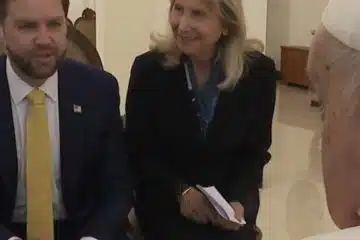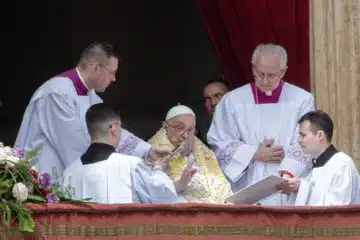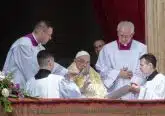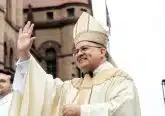Youth adult and youth ministry focus of dialogue session
July 28, 2011
By Mike Dyer
ARCHDIOCESE —The views and experiences from and about Catholic young adults were varied throughout the room, but the discussion provided a great deal of reflection during a one-time dialogue session June 28 regarding the future of young adult and youth ministry in the Archdiocese of Cincinnati.
More than a dozen people of various age groups and representing parishes throughout the archdiocese attended the special two-hour session that was held at the archdiocesan Central Offices June 28. Sean Reynolds, director of the Office of Youth and Young Adult Ministry, moderated the session and provided in-depth information regarding a year-long study his office just completed with ministry professionals, pastors, archdiocesan staff and Archbishop Dennis M. Schnurr about the future of young adult ministry.
The first hour provided highlights from the draft of the pastoral plan that was presented and approved by the archbishop this spring. The second hour allowed for discussion among the participants about different experiences they’ve had with the challenges and opportunities associated in ministering to young adult Catholics, defined as those ages 19-39.
“I was very impressed by the honesty, directness and willingness on the part of the participants to engage in conversation about the very real issues that make young adult ministry so challenging,” said Reynolds.
Reynolds said his office started to think about the young adult ministry topic back in 2005 when the book, Soul Searching — The Religious and Spiritual Lives of America’s Teenagers, was published.
Citing plenty of additional research and conversations with hundreds of people across the archdiocese, the Office of Youth and Young Adult Ministry included five sections summarized in the draft pastoral plan.
The first section mentions the challenges the church faces with young adults across the country and in the archdiocese. The challenges are numerous, including having to combat a “consumer culture that defaults to compartmentalizing and commodifying virtually everything, including faith and spiritual goods,” and the “individualistic culture that promotes the individual at the expense of family, community and the common good.”
However, the draft pastoral plan also indicates there are several opportunities to connect with today’s young adults, including the widespread electronic communication available, the popularity of volunteer service and, in most cases, a culture of tolerance that rejects prejudice and bigotry.
In the second section, titled “The Call We Hear,” the plan explains how God is calling today’s youth and young adults in a variety of ways. This section explains how those who are young adult ministry leaders or work with young people can learn to improve on firming up Catholic identity, which includes showing examples of how to live sacramentally, baptismally and eucharistically. There are also other principles, including the need to place and keep Christ at the center, evangelization, catechesis, discipleship, discernment of vocations and stewardship, service and justice and diversity and inclusivity.
The third section includes “Mapping the Way Forward,” and offers examples of how parents and families impact faith, leadership development, the hospitality and vitality of the faith community, especially at weekend Mass, and Christ-centered ministry programming focusing on evangelization, catechesis, discipleship, retreat ministry and faith sharing.
The fourth section, “Next Steps,” features priorities that include renewal of various current programs, developing other programs for parents and families, leadership within parishes and schools and the faith community.
The plan also includes the progress of several initiatives and others that are being proposed. One of the initiatives is for large-group gatherings where different offices arrange for meetings for Catholic youth and young adults. Another possibility is a regional hub strategy through which parishes could be identified to concentrate resources to help young adult ministry programs in various regions of the archdiocese.
In addition, the plan notes how the Theology on Tap program has been successful, with an increase from two to seven locations in the past three years. (An eighth Theology on Tap program is in the works for the Piqua area).
At the end of the meeting, the participants were able to assess some of the proposed approaches for elevating young adult ministry, including the regional centers or hubs, the large gatherings, young adult groups in parishes, social media and affinity groups that target certain professionals in specific careers.
Father Kyle Schnippel, archdiocesan vocation director, said the conversations among the group were very beneficial for understanding issues important to Catholic young adults.
Amy McEntee, assistant director of the archdiocesan Office of Evangelization and Catechesis in Dayton, agreed. She offered significant insights into research and studies to the discussion. McEntee, who is a member of St. Helen Parish in Dayton, said young adults have a variety of diverse interests and believes the meeting was a good example of a microcosm of the larger church community.
“In some ways, it highlights why this is such a challenging endeavor, because people are all over the board in terms of spirituality, in terms of their catechetical experience, in terms of their interest in being engaged in the church,” McEntee said. “…It is affirming of the challenge that is out there.”












